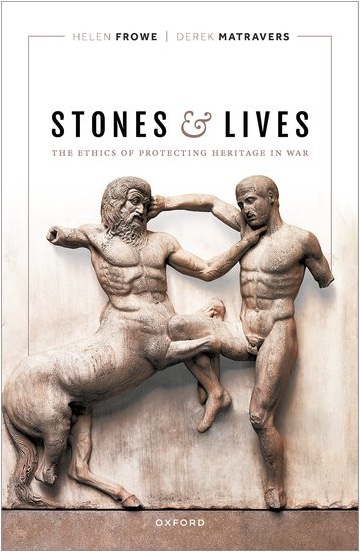Stones and Lives: The Ethics of Protecting Heritage in War
American College of Greece
Athens 22-23 May 2024
Co-hosted by SCEWP, the Open University and the American College of Greece
This two-day interdisciplinary workshop will bring together philosophers and heritage researchers to discuss Helen Frowe and Derek Matravers’ Stones and Lives: The Ethics of Protecting Heritage in War (in press, OUP).
Speakers:
Helen Frowe (Philosophy, Stockholm University)
Derek Matravers (Philosophy, Open University)
Ruth Young (Archaeology, University of Leicester)
Cécile Fabre (Philosophy, Oxford University)
Ammar Azzouz (Geography and the Environment, Oxford University)
Shuk Ying Chan (Political Science, University College, London)
Roger O’Keefe (Law, University of Boccini)
Andreas Carlsson (Philosophy, Inland Norwegian University)
Gerald Lang (Philosophy, Leeds University)
Daniel Schwartz (Political Science and International Relations, Hebrew University of Jerusalem)
David Garrard (Built Environment, Oxford Brookes University)
The destruction of heritage in war has attracted considerable attention in recent years, due in no small part to ISIS’s campaign of destruction across the Middle East and, in 2012, the International Criminal Court’s first prosecution of heritage destruction as a war crime. Regular armed forces have been criticised both for failing to protect and damaging heritage sites. In response, heritage organisations urge the development and better implementation of international laws on heritage protection in war. This book argues that any such laws or policies will require combatants to choose between safeguarding heritage and safeguarding other goods, including human life. It thus rejects the view, common among heritage professionals, that the apparent choice between protecting heritage and protecting lives presents a false dichotomy. Existing international law not only implies such choices but also, and more worryingly, gives no indication of how they should be resolved.
Drawing on contemporary work on the ethics of war, Frowe and Matravers develop an account of the permissible protection of heritage in war. They argue that heritage is not morally special; rather, heritage is one of many goods that contribute to individuals’ lives going well and that we routinely trade off against each other. By drawing on these more familiar dilemmas, we can make progress on how to balance the protection of heritage against risks to human life. Amongst other things, the book considers the different ways in which heritage might contribute to individual flourishing, the role of consent in justifying the imposition of risk on combatants and civilians, the permissibility of forcefully defending heritage and what, if anything, could compensate for the loss of heritage in war. The result is a novel, restrictive account that challenges the current trend of calling for the greater protection of heritage in war.
Registration for the workshop is now closed. A schedule is available here.



